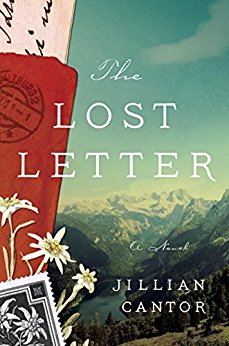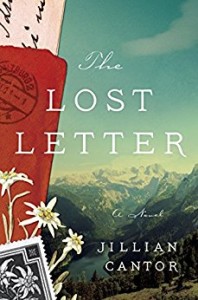
Q&A with Author of “The Lost Letter”
 Jillian Cantor’s new novel, The Lost Letter, alternates between two very different protagonists and settings. In 1938 Austria, young Kristoff is apprenticed to a master stamp engraver, while in Los Angeles in 1989 a journalist, Katie Nelson, is in the process of getting a divorce and working out new ways of relating to her father, who has Alzheimer’s and now lives at The Willows.
Jillian Cantor’s new novel, The Lost Letter, alternates between two very different protagonists and settings. In 1938 Austria, young Kristoff is apprenticed to a master stamp engraver, while in Los Angeles in 1989 a journalist, Katie Nelson, is in the process of getting a divorce and working out new ways of relating to her father, who has Alzheimer’s and now lives at The Willows.
As radically different as these characters’ experiences are on the surface, the novel slowly discloses that they are in fact inexorably linked.
Q. Your last novel, The Hours Count, featured Julius and Ethel Rosenberg. Did you encounter historical models for your characters as part in your research for The Lost Letter?
Kristoff and the Fabers are completely fictional, but I did find stories about real engravers in Europe who came to work with the resistance and forge papers, as Kristoff eventually does. I also found different real ways stamps were used in the resistance throughout the war. For example, the British special ops forged stamps by replacing Hitler’s head with Himmler’s, hoping to cause infighting in the regime, but then they put them into circulation and no one noticed! The stamps and resistance efforts in my novel are fiction, but it did all start for me with the idea that real stamps were used in the real resistance.
Q. Stamps of a certain time and place serve beautifully to pull the various threads of The Lost Letter together. Were you certain from the beginning of the novel that you wanted to use stamps—and one particular stamp—as a pivot for your story?
The idea for the novel started with stamps, so I was certain about that much from the beginning. I was chatting with my agent one day about what I was going to write next, and she asked me if I’d ever thought about the people who illustrate postage stamps. (I hadn’t before then!) I began to do a little research about stamp engravers, stamps in WWII, and stamp collecting, and the story blossomed from there. The idea that it would be about one particular stamp came a bit later, as I was writing the first draft and plotting out the novel.



